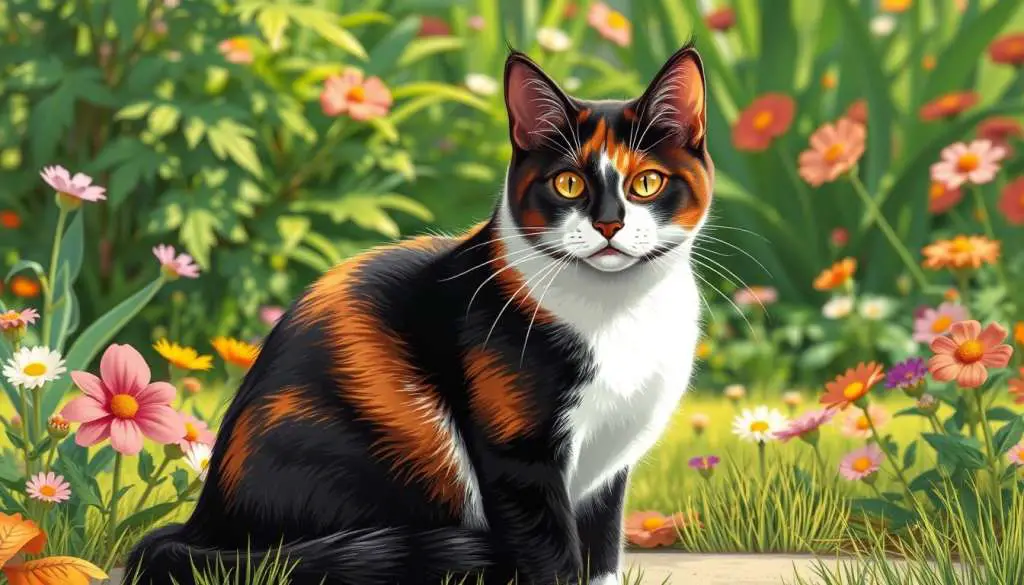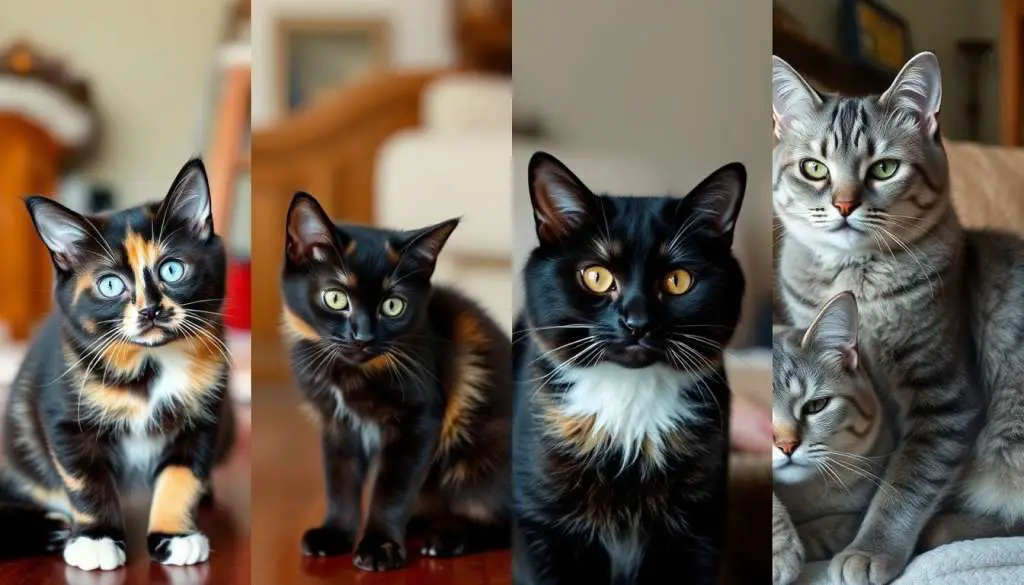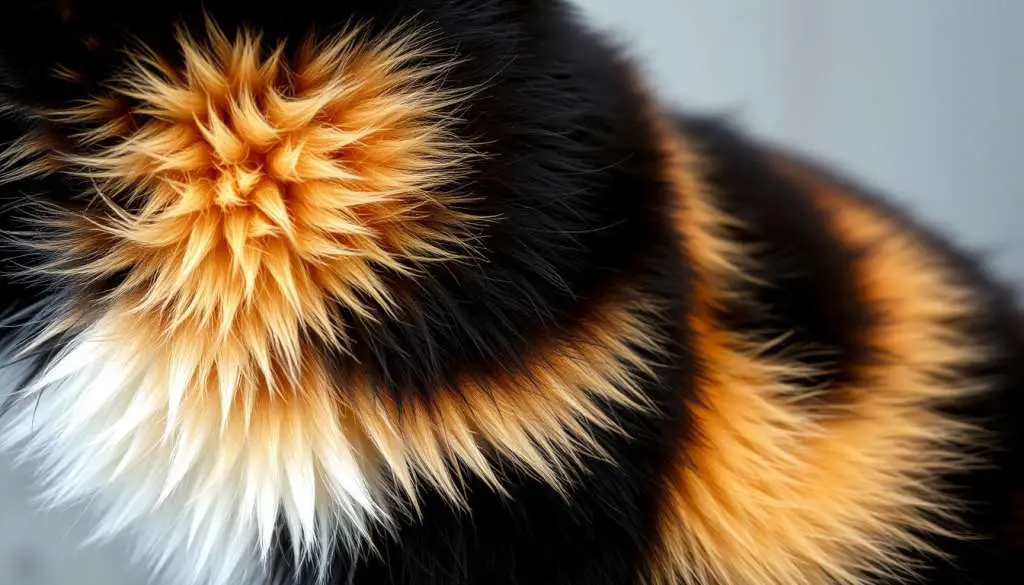Ever seen a cat with a coat that seems to tell a story? Dark calico cats are a stunning genetic marvel that fascinates cat lovers. They are not just ordinary house cats but are walking masterpieces of nature’s color palette.
Dark calico are a rare and enchanting sight in the feline world. Unlike regular calico cats, they have deeper, richer base colors. This makes their coat pattern even more dramatic. Their unique genetics mean no two dark calico are alike, making each one special.
When you see a dark calico, their complex coloration will catch your eye. They often have deep black, chocolate, or gray bases with patches of cream, rust, or burnt orange. These cats are not only beautiful but also have a genetic complexity that makes them stand out.
Key Takeaways
- Dark calico feature unique, rich color base patterns
- Each dark calico has a distinct, unrepeatable coat design
- Genetic factors determine their complex multicolored appearance
- These cats are predominantly female due to genetic inheritance
- Dark calico represent a rare subset of the calico population
Understanding the Unique Dark Calico Pattern
Dark calico are a true marvel in the world of domestic shorthairs. Their coat patterns are a mix of colors and genetics. This makes each dark calico truly unique.
Base Colors and Pigmentation
Dark calico have deep black, rich brown, and sometimes gray as their base colors. These colors mix with cream or white patches, creating a stunning mosaic. The way these colors are spread out is key to their beauty.
- Black and brown are the main colors in dark calico coats
- White patches add contrast and definition
- The intensity of these colors can vary
Genetic Factors Behind Dark Calicos
The pattern in dark calico comes from genetics. Female cats usually have this pattern because of their X-chromosomes. Male dark calicos are very rare, making them even more special.
“The genetic complexity of dark calico makes them a true marvel of nature’s design.” – Feline Genetics Research Institute
Pattern Distribution Guidelines
| Color Pattern | Typical Distribution | Percentage |
|---|---|---|
| Black Patches | Primary coat coverage | 40-50% |
| Brown Patches | Secondary color regions | 30-40% |
| White Patches | Accent and contrast areas | 10-20% |
Knowing these unique traits helps us appreciate the amazing genetic makeup of dark calico.
The Genetics Behind Calico Coloration
Calico cats have a fascinating genetic makeup. Their multicolored coats are not random. Instead, they result from a complex interaction of X chromosomes.
Calico cats owe their colors to X-inactivation. Female cats have two X chromosomes. This allows them to show off a tri-color pattern. Each X chromosome has different color genes, leading to patches of various colors.
“Nature’s genetic artwork is most beautifully expressed in the calico cat’s unique coat pattern.” – Feline Genetics Research Institute
Several genetic factors play a role in calico coloration:
- X chromosome color inheritance
- Random gene expression
- Specific pigmentation mechanisms
Male tabby cats rarely become calicos. This is because of their different chromosomes. Female cats have a special genetic advantage that lets them display this stunning multicolor.
The genetic dance behind calico patterns is complex. It shows how feline genetics can create stunning visual diversity in our pets.
Common Characteristics of Dark Calico Cats
Dark calico are amazing pets that win the hearts of many. They have a unique look and a special personality. These cats are known for their unique traits and fun nature.
Physical Features That Distinguish Dark Calicos
Dark calico have some amazing physical traits:
- Coat patterns with deep, rich colors
- Base colors like black, chocolate, or dark gray
- Clear patches of different colors
- Medium to large size
Temperament and Personality Insights
Dark calico have vibrant and spirited personalities. They are known for:
- Being very smart
- Being strong-willed
- Being playful and full of energy
- Forming deep bonds with their owners
Behavioral Patterns to Understand
Knowing how dark calico behave can help you connect with them better. They usually show:
| Behavior Category | Characteristic Traits |
|---|---|
| Social Interaction | Selective but affectionate |
| Play Preferences | Interactive toys, puzzle challenges |
| Communication | Vocal, expressive body language |
| Territory | Protective of personal space |
“Every dark calico has a unique personality that makes them an extraordinary companion animal.” – Feline Experts
Each dark calico is special in their own way. They make great pets for those who love their unique charm.
Differences Between Dark Calico and Traditional Calico Cats
Dark calico are a special type of calico cat. They have a deeper and richer color than traditional calicos. This makes them stand out in the world of feline coat patterns.
The main differences between dark and traditional calico cats are:
- Color Intensity: Dark calico have deeper, more vibrant colors
- Pigmentation Patterns: Their coats are dominated by dark black and brown
- Genetic Complexity: They have unique genetic traits that make them look different
Genetic studies show that dark calico get their unique look from special genetic changes. These changes affect how the X-chromosome colors their fur. This results in a more dramatic and rich coat pattern than traditional calicos.
“Each dark calico is a living canvas of genetic artistry, with no two patterns exactly alike.”
Traditional calico cats usually have lighter colors like cream, white, and orange. But dark calico have darker shades of charcoal, black, and brown. This makes them very eye-catching among house cat breeds.
Knowing these differences helps us appreciate the amazing genetic variety in calico cats. Whether you love cats or just find them interesting, dark calico are a special and beautiful variation of the calico pattern.
Health Considerations for Dark Calico Cats
Caring for a dark calico domestic shorthair means knowing their health needs. These pets have special medical needs that every owner should know. This ensures they stay healthy and happy.
Common Medical Challenges
Dark calico face health issues due to their genetics. These can include:
- Genetic predispositions related to coat color
- Higher risk of certain inherited conditions
- Potential hormonal imbalances
Preventive Care Strategies
Preventive care is key for your dark calico’s health. Important steps include:
- Annual veterinary check-ups
- Regular vaccinations
- Comprehensive physical examinations
- Early screening for genetic health risks
Nutrition and Dietary Needs
Your dark calico’s diet is crucial for their health. Tailored nutrition can help prevent potential medical complications. Here are some dietary tips:
- High-quality protein-rich cat food
- Age-appropriate nutritional formulas
- Balanced mineral and vitamin supplements
“A well-planned diet is the foundation of your cat’s long-term health and happiness.” – Veterinary Nutrition Expert
Knowing these health considerations helps you care for your dark calico better. They are unique and beautiful companions.
The Rarity of Male Dark Calico Cats
The world of dark calico is full of mystery. Male dark calico are very rare. Less than one in every 3,000 calico cats is male, making them a true genetic anomaly.

The reason for this rarity is the complex genetics of coat color inheritance. Female cats have two X chromosomes, which allows for the unique multicolored pattern. Males typically have only one X chromosome, which makes their genetic makeup fundamentally different.
“In the genetic lottery of feline coloration, male dark calico are like winning a rare genetic jackpot.” – Feline Genetics Research Institute
Understanding the genetic complexity requires diving into some key points:
- Dark calico require two X chromosomes to display their unique coloration
- Male calicos typically have a genetic condition called Klinefelter syndrome
- These rare males carry an extra X chromosome (XXY)
The genetic rarity of male dark calico comes with potential health challenges. Most male calicos are sterile and may experience various genetic complications due to their unique chromosomal structure.
While female dark calico are common, finding a male is so unlikely that they’re considered almost mythical in the feline world. Their unique genetic makeup makes them a true marvel of nature’s intricate genetic design.
Caring for Your Dark Calico Cat
Welcoming a dark calico into your home is a big step. It means you’re ready to care for a unique pet. These cats need special attention and care to stay happy and healthy.
Understanding what your dark calico needs is key. Creating a loving home environment is crucial for their well-being.
Grooming Requirements
Dark calico need regular grooming to keep their coat looking great. Brushing them often prevents mats and reduces hairballs.
- Brush 2-3 times weekly with a soft-bristled brush
- Use specialized cat grooming tools for different coat lengths
- Check for skin irritations during grooming sessions
Exercise Needs
It’s important to keep your dark calico active. This keeps them physically and mentally fit. Playing with them daily helps prevent obesity.
- Provide daily play sessions lasting 10-15 minutes
- Use interactive toys like laser pointers and feather wands
- Create vertical spaces with cat trees for climbing
Environmental Enrichment
Keeping your cat’s environment interesting is vital. It prevents boredom and stress.
| Enrichment Strategy | Benefits |
|---|---|
| Window perches | Mental stimulation and bird watching |
| Puzzle feeders | Mental engagement during mealtime |
| Rotating toy collection | Prevents play monotony |
“A stimulated cat is a happy cat” – Veterinary Experts
With the right care, your dark calico will be a loving companion for many years.
Dark Calico Cats in Different Breeds
Dark calicos are a stunning sight in many domestic cat breeds. They are not limited to one breed but can be found in several, making each cat unique and beautiful.
The domestic shorthair is the most common breed to show the dark calico pattern. These cats, also known as moggies, have striking black, gray, and white patches.
Breed-Specific Dark Calico Characteristics
- American Shorthair: Frequently produces dark calico variations
- Maine Coon: Can exhibit dark calico patterns with longer fur
- Persian: Occasionally develops dark calico coat colorations
Genetics are key in showing how dark calico patterns vary in different breeds. Some cats have bold patches, while others have more subtle colors.
| Breed | Dark Calico Frequency | Coat Type |
|---|---|---|
| Domestic Shorthair | High | Short |
| Maine Coon | Medium | Long |
| Persian | Low | Long |
“The beauty of dark calico lies in their unique genetic makeup and unpredictable color patterns.” – Feline Genetics Research Institute
Knowing about breed-specific traits helps us see the amazing variety in dark calico. Whether you prefer a purebred or a moggy, these cats are truly eye-catching.
Life Expectancy and Aging Patterns
Knowing how long your dark calico pet will live is key to giving them the best care. These special cats usually live between 12 to 16 years. Some might even live up to 20 years with the right care.

Age-Related Physical Changes
As your cat gets older, you’ll see changes in how they look and feel. Dark calico go through changes that need careful watching:
- Reduced muscle tone and potential weight changes
- Decreased mobility and flexibility
- Potential vision and hearing loss
- Graying fur around the muzzle and face
Senior Care Guidelines
Looking after an aging dark calico means making some changes. Here are some important tips:
- Schedule bi-annual veterinary check-ups
- Adjust diet to senior-specific nutritional needs
- Provide gentle, low-impact exercise
- Create comfortable resting areas with easy access
“Aging is a natural process, and with proper care, your dark calico can enjoy a comfortable and happy senior life.” – Veterinary Feline Specialists
By keeping a close eye on your cat and taking good care of them, you can make their golden years happy and comfortable.
Training and Socialization Tips
Training a dark calico needs patience, consistency, and understanding of their unique personality. These animals can be smart and respond well to the right training methods.
Begin training your cat early to teach good habits and strengthen your bond. Use positive reinforcement to reward good actions.
- Use treats and praise to encourage good behavior
- Keep training sessions short and engaging
- Be consistent with commands and expectations
- Create a calm and supportive learning environment
Socialization is key for a well-adjusted dark calico. Introduce them to various people, sounds, and places slowly.
“Patience and positive reinforcement are key to successful cat training.” – Feline Behavior Experts
| Training Goal | Recommended Techniques | Age to Start |
|---|---|---|
| Litter Box Training | Consistent placement, praise, treats | 8-12 weeks |
| Scratch Post Training | Redirect scratching, catnip incentives | 12-16 weeks |
| Basic Commands | Clicker training, verbal cues | 16-24 weeks |
Remember that each dark calico has a unique personality. Tailor your training to fit your pet’s temperament and learning style.
Popular Myths About Dark Calico Cats
Dark calico have long captured human imagination, sparking numerous myths and fascinating cultural beliefs. These multicolored felines have been the subject of intriguing stories across different cultures. They blend folklore with mysterious interpretations of their unique coat patterns.
Cultural Beliefs Surrounding Calico Cats
Different cultures have developed unique perspectives about dark calico. Many societies attribute special characteristics to these remarkable felines:
- In Japanese folklore, calico cats are considered lucky charms
- Maritime traditions suggest calico cats bring good fortune to sailors
- Some cultures believe these multicolored cats possess supernatural abilities
Scientific Facts vs. Fiction
While cultural myths paint dramatic pictures, scientific research offers more grounded insights into these distinctive felines. Genetic research reveals fascinating truths about dark calico:
| Myth | Scientific Fact |
|---|---|
| Calicos have magical powers | Unique X-chromosome genetic variation determines coat pattern |
| Only female cats can be calicos | Male calicos exist but are extremely rare (approximately 1 in 3,000) |
| Calico cats have specific personality traits | Coat color does not determine temperament |
“The beauty of a dark calico lies not in myths, but in their remarkable genetic complexity.” – Feline Genetics Research Institute
Understanding these myths helps appreciate the true wonder of dark calico. Their unique genetic makeup creates stunning coat patterns that continue to fascinate cat lovers worldwide.
Conclusion
Dark calico are a rare and fascinating breed. They offer a unique feline experience to pet owners. Their coat patterns and genetic makeup make them special additions to any home.
Understanding their unique traits helps you care for them better. Each dark calico has its own personality and characteristics. They are not just ordinary cats but special companions with deep bonding potential.
Proper care and nutrition are key to a happy relationship with your dark calico. This ensures a long and joyful life together.
Having a dark calico is rewarding. They have stunning looks and complex genetics that set them apart. Learning about their needs and health ensures they thrive in your family.
Dark calico are more than pets; they are unique companions with captivating stories and personalities. By embracing their individuality and providing attentive care, you’ll create a meaningful bond with them.







